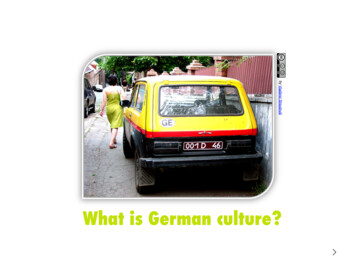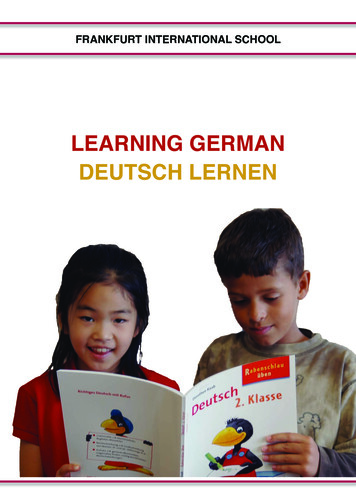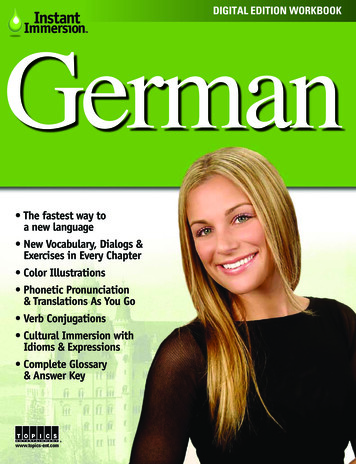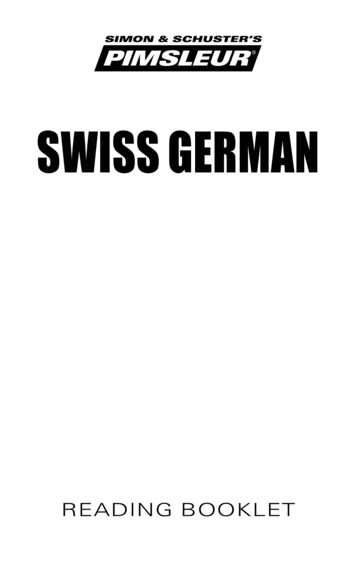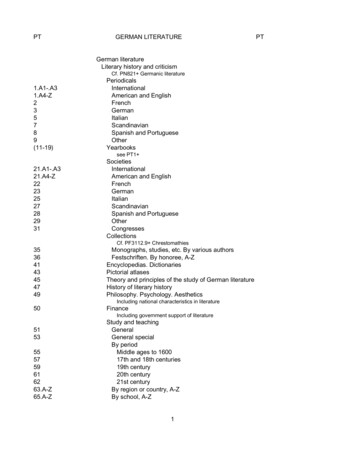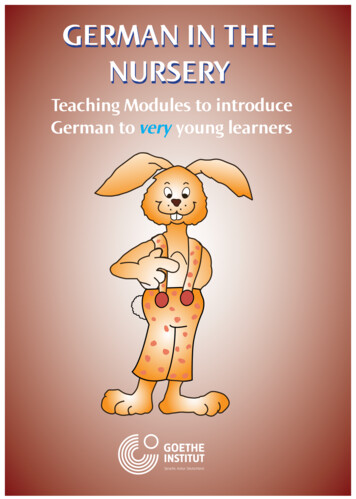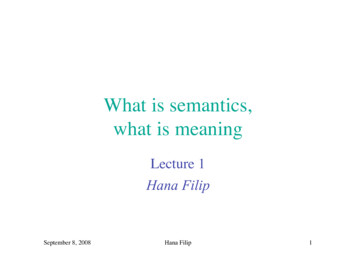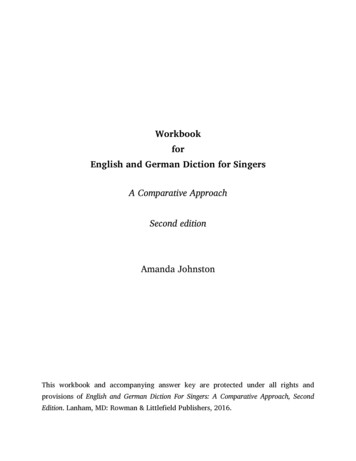
Transcription
WorkbookforEnglish and German Diction for SingersA Comparative ApproachSecond editionAmanda JohnstonThis workbook and accompanying answer key are protected under all rights andprovisions of English and German Diction For Singers: A Comparative Approach, SecondEdition. Lanham, MD: Rowman & Littlefield Publishers, 2016.
ContentsPrefaceixPART I: INTRODUCTION1Chapter 1: Elementary Concepts2Vowel classification2Quiz no.1: Organs of speech4Quiz no.2: Points of articulation5Quiz no.3: Phonetic and anatomical terms6Consonant classification2Chapter 2: Proficiency in English IPA9Vowel classification9Vowels9Consonant classification14Reverse IPA assignment no.117Reverse IPA assignment no. 218Assignment no.1: Vowels and consonants20Assignment no.2: Vowels and consonants21Consonants14Chapter 3: Proficiency in German IPA22Vowel classification22Vowels22Consonant classification26Assignment no.1: Vowels and consonants30Assignment no.2: Vowels and consonants31Consonants26iii
PART II: ENGLISH32Chapter 6: The Structure of English33Silent letters33The Hidden schwa33Word stress34Homophones34Lyric diction syllabification35Primary stress in polysyllabic words35Assignment no.1: Silent letters and homophones37Assignment no.2: Glottal onsets38“Unstress” and the schwa36Chapter 7: Characteristic English Phonemes39[ɑ] vs. [æ]39Prevalence of the schwa [ə]39Use of Y40Linking R41Assignment no.1: Use of R according to texture and genre46Assignment no.2: Use of R according to texture and genre50Allophones of R according to texture and genreChapter 8: ssignment no.1: IPA transcription of poem62Assignment no.3: IPA transcription of poem66Assignment no.4: IPA transcription of poem68Assignment no.2: IPA transcription of poemChapter 9: Glides and Approximants6470Glides and approximants70iv
Assignment no.1: Diction choices according to style and genre73Assignment no.2: Diction choices according to style and genre78Chapter 10: Consonants82Voiced vs. voiceless82Consonants82Consonant blends and syllabic consonants86Rhythmic timing and release of consonants87Assignment no.2: Rhythmic timing and release of consonants89Assignment no.1: Rhythmic timing and release of consonantsChapter 11: Advanced Concepts in Diction8890Strong and weak forms of incidental words90Special circumstance: -ed suffix91Prefixes92Prefix or not?93Implosion/explosion94Assignment no.2: Prefixes97Assignment no.3: Prefixes98Assignment no.4: Implosion/explosion99Assignment no.1: Strong and weak forms of incidental wordsSample Tests: English96100Quiz no.1: Diction choices according to style and genre100Quiz no.2: Diction choices according to style and genre104Quiz no.3: Diction choices according to style and genre107PART III: GERMAN110Chapter 13: Introduction to German Diction for Singers111Eszett (ß) vs. ss111Alternative spellings for Umlauts111Terminology quiz112v
Chapter 15: The Structure of German113Root stem113Word elements113Separable and inseparable prefixes118Suffixes119Compound words120Grammatical and inflective endings123Prefixes117Glottal onsets124Chapter 16: Characteristic German Phonemes126Characteristic German phonemes126Assignment no.2: Characteristic German phonemes130Assignment no.3: Characteristic German phonemes132Assignment no.1: English and German comparativeChapter 17: Vowels129134Monophthongs134Diphthongs136Common exceptions137Practice Quiz no.1: Vowels138Practice Quiz no.2: Common exceptions140Chapter 18: Consonants141Voiced vs. voiceless141Consonants142Selected consonant blends148Rhythmic timing and release of consonants149Contractions147Chapter 19: Advanced Concepts in DictionImplosion/explosionStrong and weak forms of incidental wordsvi150150152
Sample Tests: German154Quiz no.1: Diction choices according to texture154Quiz no.3: Diction choices according to texture161Quiz no.2: Diction choices according to texture157PART IV: ENGLISH AND GERMAN—COMMON GROUND165Chapter 21: Commonalities Between English and German166Assignment no.1: Common vowels and consonants166Assignment no.2: Treatment of monosyllabic, incidental words168Assignment no.3: Rhythmic timing and release of consonants169Chapter 22: Legato Singing172Assignment no.1: Glottal onsets and legato172Assignment no.2: Phrasal elision and use of R173Chapter 23: Close but No Cigar175Assignment no.1: Comparative diction175Assignment no.2: Comparative diction177Assignment no.3: Comparative diction179Practice Exams181Practice Exam no.1: English181Practice Exam no.2: English186Practice Exam no.1: German190Practice Exam no.2: German195Practice Exam no.2: English and German203Practice Exam no.3: English and German207Practice Exam no.4: English and German213Practice Exam no.1: English and Germanvii199
Appendix B: Supplements219English tongue twisters219German tongue twisters221About the Author230viii
PrefaceI am pleased to present a comprehensive workbook for English and German Diction forSingers: A Comparative Approach, Second Edition. All written exercises are catered to thesecond edition and provide expanded opportunity for practicing the quintessentialphonemes integral to both English and German. Further, there are several sample tests,quizzes, as well as assignments that may be used to prepare for midterm and finalexams. Upon request, an answer key will be provided free of charge to all professorsusing the book in the classroom.ix
PART I: INTRODUCTION
Chapter 1: Elementary ConceptsVowel Classification1. List the primary Cardinal Vowels, writing the symbols in IPA1.2.3.4.5.6.7.8.2. List the front Cardinal Vowels in order of tongue position (high to low)1.2.3.4.3. List the back Cardinal Vowels in order of tongue position (low to high)1.2.3.4.Consonant Classification1. Fill in the following chart for English alVelarUvularGlottal2Lateral TrillNasal Affricate
2. Fill in the following chart for German latalVelarUvularGlottal3. Name the point of articulation for the following consonants and glides, e.g., [t](Answer: ʝ][ʒ][ʍ][ʣ][ç][θ]3
Quiz no.1: Organs of speech1) Name the organs of speech as indicated on the following diagram:71543268691011125 129610371148124
Quiz no.2: Points of articulation1) Identify the points of articulation on the following diagram:61 2 3478591011121592610371148125
Quiz no.3: Phonetic and anatomical termsProvide definitions and examples for the following phonetic and anatomical terms, e.g.,plosive (Answer: a consonant whereby the air in the vocal tract is completely blocked,then released audibly, for example, t palatedentalapproximantplosivealveolarlateral6
eglottalconsonantlabiodentalvelar7
close vowelhard palateopen vowellarynxpharynx8
Chapter 2: Proficiency in English IPAVowel ClassificationCategorize each of the following English vowels (front, back, central, R-less), e.g., ][ʊ]VowelsTranscribe the missing vowel(s) into IPA, e.g., queen [kw n] (Answer: [kwin]).1. [i] vs. [ɪ]bleed [bl d]yield [j ld]implore [ mˈ plɔə]spirit [sp ɹ t]each [ ʧ]caffeine [kæˈ f n]mirror [m ɹə]qualities [kwɔl t z]daisy [deɪz ]achieve [əˈ ʧ v]these [ð z]routine [ɹuˈ t n]citizen [s t sən]sunny [sʌn ]candies [kænd z]prestige [pɹɛsˈ t ʒ]reach [ɹ ʧ]guilt [ɡ lt]2. [i] vs. [ɛ]heathen [h ðən]bread [bɹ d]instead [ɪnˈ st d]please [pl z]sweater [sw tə]treachery [tɹ ʧəɹɪ]9
leave [l v]teach [t ʧ]threat [θɹ t]dream [dɹ m]breach [bɹ ʧ]weapon [w pən]leather [l ðə]speaking [sp kɪŋ]cream [kɹ m]meadow [m doʊ]3. [ɛ] vs. [æ]carry [k ɹɪ]any [ nɪ]shall [ʃ l]answer [ nsə]anger [ ŋɡə]adversary (n.) [ dvəs ɹɪ]rat [ɹ t]narrow [n ɹoʊ]had [h d]barren [b ɹən]magic [m ʤɪk]vanish [v nəʃ]secretary [s kɹət ɹɪ]says [s z]ask [ sk]carrot [k ɹət]capture [k pʧə]annals [ nəlz]sparrow [sp ɹoʊ]mercenary [mɜsən ɹɪ]4. [ʌ] vs. [ə]patrol [p ˈ tɹoʊl]maiden [meɪd n]sadness [sædn s]pardon [pɑəd n]enough [ɪˈ n f]utter [ t ]pedal [pɛd l]virus [vaɪɹ s]lament [l ˈ mɛnt]fun [f n]one [w n]flood [fl d]needed [nid d]trumpet [tɹ mp t]untrue [ nˈ tɹu]couple [k p l]crimson [kɹɪmz n]wonder [w nd ]supper [s p ]unkind [ nˈ kaɪnd]5. [ɑ] vs. [ɔ]10
talk [t k]fall [f l]massage [məˈ s ʒ]safari [səˈ f ɹɪ]façade [fəˈ s d]prophets [pɹ fəʦ]exhaust [ɪɡˈ z st]naughty [n tɪ]hawk [h k]hot [h t]father [f ðə]pawn [p n]horrid [h ɹəd]sought [s t]camouflage [kæməfl ʒ]altered [ ltəd]sorry [s ɹɪ]recall [ɹɪˈ k l]corsage [k əˈ s ʒ]gone [ɡ n]6. [u] vs. [ʊ]stood [st d]soot [s t]too [t ]noon [n n]woo [w ]brook [bɹ k]cook [k k]moon [m n]good [ɡ d]food [f d]doom [d m]pool [p l]hook [h k]soon [s n]crook [kɹ k]mistook [mɪsˈ t k]foolish [f ləʃ]gloom [ɡl m]shook [ʃ k]loose [l s]wool [w l]cool [k l]7. [ɜ] vs. [ə]earn [ n]urge [ ʤ]earth [ θ]mother [mʌð ]early [ lɪ]perverse [p ˈ v s]urchin [ ʧən]curb [k b]turn [t n]heard [h d]murmur [m m ]dirt [d t]butter [bʌt ]person [p s n]11
were [w ]sir [s ]burr [bunder [ʌnd ]]weather [wɛð ]further [f ð ]pervert [p v t]murder [m d ]herself [h ˈ sɛlf]learner [l n ]server [s v ]burly [b lɪ]bird [b d]worm [w m]girl [ɡ l]perplex [p ˈ plɛks]word [w d]colonel [k n l]tersely [t slɪ]ordered [ɔəd d]surreal [s ˈ ɹil]shirking [ʃ kɪŋ]soldier [soʊlʤ ]perturbed [p ˈ t bd]actor [ækt ]rehearse [ɹɪˈ h s]earnest [ n st]pursuit [p ˈ sjut]Herbert [h b t]purging [p ʤɪŋ]world [w ld]survey (n.) [s veɪ]furry [f ɹɪ]merge [m ʤ]worry [w ɹɪ] or [wʌɹɪ]surmise [s ˈ maɪz]worst [w st]fern [f n]hurry [h ɹɪ] or [hʌɹɪ]flurry [fl ɹɪ] or [flʌɹɪ]surprise [s ˈ pɹaɪz]preferred [pɹɪˈ f d]8. Diphthongs [aɪ][eɪ][aʊ][oʊ][ɔɪ]widen [wdən]nation [nʃən]spoil [spthou [ðd]house [hl]straight [stɹload [lmalign [məˈ lt]loincloth [l]roe [ɹdestroy [dɪˈ stɹ]lie [lboy [bsoul [sl]steak [stdowdy [d12nklɑθ]]]ðə]n]]sigh [sneither [ns]]k]dɪ]
feign [fn]choice [ʧs]9. Diphthongs borrowed from RP [ɑə][ɛə][ɪə][ɔə][ʊə]cheer [ʧ]gargle [ɡɡəl]paired [pd]soared [sd]moor [m]share [ʃ]insure [ɪnˈ ʃstair [st]pier [p]heir [adore [əˈ d]]]appear [əˈ p]tə]poor [p]quarter [kwhere [h]starve [stv]dearly [dlɪ]]prayer [pɹ]course [ks]where [ʍgourd [ɡd]prepare [pɹɪˈ pore []pour [psteer [st]darkness [dsincere [sənˈ stear [t] or [sɪnˈ s] or [tbear [b]detour [ditknəs]]]force [f]]]s]hearth [hθ]contour [kɑntyore [j]]10. Triphthongsaspire [əˈ sp]bower [bsour [s]dire [dlyre [l]flour [flprior [pɹ]choir [kwpyre [p]fired [f]devour [dɪˈ vfriar [fɹcower [k]]d]]power [p]inspired [ɪnˈ sp]glower [ɡl]scoured [sk]tower [td]]]inquire [ɪnˈ kwd]crier [kɹ13]]
Consonant ClassificationCategorize the following English consonants and semiconsonants (plosive, fricative,nasal, lateral, affricate, approximant), e.g., [t] ][ɹ]ConsonantsTranscribe the missing consonant(s) into IPA, e.g., talc [ æl ] (Answer: [tælk]).11. Plosives (Stops) [b][p][d][t][ɡ][k]aghast [əˈ æs ]behind [ ɪˈ haɪn ]shellac [ʃəˈ læ ]beard [ ɪə ]knob [nɑ ]lobby [lɑ ɪ]gallop [ ælə ]occupy [ɑ jʊ aɪ] or [ɑ jə aɪ]excerpt (n.) [ɛksə]nugget [nʌ ə ]fold [foʊl ]abbess [æ əs]dialogue [ aɪəlɑ ]mountain [maʊn ən]antique [ænˈ i ]cheddar [ʧɛ ə]shutter [ʃʌ ə]speed [s i ]14
code [ oʊ ]happen [hæ ən]puddle [ ʌ əl]supper [sʌ ə]rattle [ɹæ əl]guilty [ ɪl ɪ]12. Fricatives [v][f][z][s][ð][θ][ʒ][ʃ][h][ʍ]theft [ ɛ t]barrage [bəˈ ɹɑ ]scenario [ əˈ nɑɹɪoʊ]whisper [ ɪ pə]parachute [pæɹə ut]social [ oʊ əl]designer [dɪˈ aɪnə]why [ aɪ]poverty [pɑ ətɪ]psychic [ aɪkɪk]spring [ pɹɪŋ]permission [pəˈ mɪ ən]divvy [dɪ ɪ]southern [ ʌ ən]sugar [ ʊɡə]confusion [kənˈ ju ən]zest [ ɛ t]whole [ oʊl]frightening [ ɹaɪtənɪŋ]message [mɛ əʤ]gather [ɡæ ə]measure [mɛ ə]nation [neɪ ən]phenomenal [ əˈ nɑmənəl]puzzle [pʌ əl]giraffe [ʤəˈ ɹæ ]should [ ʊd]teeth [ti ]cough [kɑ ]cedar [ idə]home [ oʊm]verbal [ ɜbəl]13. Nasals [m][n][ŋ][ɲ]think [θɪ k]malign [ əˈ laɪ ]merry [ ɛɹɪ]gnome [ oʊ ]Bronx [bɹɑ ks]autumn [ɔtə ]summit [sʌ ət]knead [ id]ringer [ɹɪ ə]qualm [kwɔ ]pinch [pɪ ʧ]newsworthy [ uzˌwɜðɪ]aplomb [əˈ plɑ ] or [əˈ plʌ ]sinner [sɪ ə]union [ju ə ]nubile [ ubaɪl]15
14. Glides and approximants [w][j][ɹ]punity [p unɪtɪ]chrome [k oʊm]quart [k ɔət]bewail [bɪˈ eɪl]phrase [f eɪz]Tuesday [t uzdeɪ]commune [kɑm un]aware [əˈ ɛə]rhinoceros [ aɪˈ nɑsə əs]cure [k ʊə]wake [ eɪk]lute [l ut]wonder [ ʌndə]million [mɪl ən]wry [ aɪ]musician [m uˈ zɪʃən]quite [k aɪt]Hugh [h u]university [ unəˈ vɜsɪtɪ]rhapsody [ æpsədɪ]equation [ɪˈ k eɪʒən]duke [d uk]wriggle [ ɪɡəl]quarterly [k ɔətəlɪ]assume [əˈ s um]wrought [ ɔt]15. Affricates [ʤ][ʧ]chained [ eɪnd]generate [ ɛnəɹeɪt]pigeon [pɪ ən]search [sɜjasmine [ æzmən]farfetched [fɑəˈ fɛlecture [lɛk ə]veggie [vɛ ɪ]gymnasium [ ɪmˈ neɪzɪəm]natural [næ əɹəl]strategy [stɹætə ɪ]justice [ ʌstəs]majesty [mæ əstɪ]dodge [dɑFiji [fi ɪ]joke [ oʊk]giant [ aɪənt]choice [ ɔɪs]large [lɑəjaw [ ɔ]]16]]t]
Reverse IPA assignment no. 1Youth, Day, Old Age, and Night[juθ deɪ oʊld eɪʤ ænd naɪt][juθ lɑəʤ lʌstɪ lʌvɪŋ][juθ fʊl əv ɡɹeɪs fɔəs fæsəˈ neɪʃən][du ju noʊ ðæt oʊld eɪʤ meɪ kʌm æftə ju][wɪθ ikwəl ɡɹeɪs fɔəs fæsəˈ neɪʃən][deɪ fʊlbloʊn ænd splɛndəd][deɪ əv ði ɪˈ mɛns sʌn][ækʃən æmˈ bɪʃən læftə][ðə naɪt fɑloʊz kloʊs wɪð mɪljənz əv sʌnz][ənd slip ənd ɹɪˈ stɔɹɪŋ dɑəknəs][wɔlt ʍɪtmən]17
Reverse IPA assignment no. 2[ɪf ðə dʌl sʌbstəns əv maɪ flɛʃ wɜ θɔt][ɪnˈ ʤʊɹɪəs dɪstəns ʃʊd nɑt stɑp maɪ weɪ][fɔə ðɛn dɪˈ spaɪt əv speɪs aɪ wʊd bi bɹɔt][fɹʌm lɪməʦ fɑə ɹɪˈ moʊt ʍɛə ðaʊ dʌst steɪ][noʊ mætə ðɛn ɔlˈ ðoʊ maɪ fʊt dɪd stænd][əˈ pɑn ðə fɑəðəst ɜθ ɹɪˈ muvd fɹʌm ði][fɔə nɪmbəl θɔt kæn ʤʌmp boʊθ si ænd lænd][æz sun æz θɪŋk ðə pleɪs ʍɛə hi wʊd bi][bʌt ɑ θɔt kɪlz mi ðæt aɪ əm nɑt θɔt][tu lip lɑəʤ lɛŋθs əv maɪlz ʍɛn ðaʊ ɑət ɡɑn]18
[bʌt ðæt soʊ mʌʧ əv ɜθ ənd wɑtə ɹɔt][aɪ mʌst əˈ tɛnd taɪmz lɛʒə wɪð maɪ moʊn][ɹɪˈ sivɪŋ nɔt baɪ ɛləmənʦ soʊ sloʊ][bʌt hɛvɪ tɪəz bæʤəz əv aɪðəz woʊ][wɪljəm ʃeɪkspɪə]19
Assignment no. 1: Vowels and consonants1. Provide the missing vowels in the IPA transcriptions of the following words:feed [f d]unhappy [ nˈ h p ]breast [bɹ st]fancy [f ns ]poutine [p ˈ t n]built [b lt]borrow [b ɹdove [d v]]feather [f ð ]haughty [h t ]carriage [k ɹ ʤ]above [ ˈ b v]ask [ sk]under [ nd ]tarry [t ɹ ]askew [ ˈ skj ]thought [θ t]gone [ɡ n]2. Provide the missing consonants and glides in the IPA transcriptions of the followingwords:babble [ æ ə ]judgement [knew [ʌdoubt [ aʊ ]ə]u]musical [ripple [ ɪ ə ]purpose [ ɜ ə ]u ɪ ə ]window [ ɪoʊ]singers [ ɪ ə ]taught [ ɔ ]gopher [ oʊ ə]cackle [ æ ə ]onion [ʌ ə ]fewer [writer [ aɪ ə]cuddle [ ʌ ə ]jury [happen [ æ ə ]ʊ ɪ]uə]otter [ɑ ə]nude [ u ]haggle [ æ ə ]azure [æ ə] or [æ ʊə]humungous [uˈ ʌə ]arid [æ ɪ ]cohort [ oʊ ɔə ]shower [ aʊə]badge [ æ]finger [ ɪə]pleasure [ɛ ə] or [Tuesday [ueɪ]ashes [æ ə ]ɛ ʊə]fabulous [ æ20u ə ]
Assignment no. 2: Vowels and consonants1. Provide the missing vowels in the IPA transcriptions of the following words:soon [s n]decoy [d kbook [b k]height [hfull [f l]lose [l z]weight [wt]goal [ɡ]t]l]pour [p]mouse [mpure [p]hair [hs]]cower [k]discover [d sˈ k v ]farthest [fð st]cheer [ʧdoomed [d md]foul [f]l]2. Provide the missing consonants and glides in the IPA transcriptions of the followingwords:very [ ɛ ɪ]fickle [ ɪ ə ]thinking [ ɪɪ ]barren [ æ ə ]why [ aɪ]dimmer [ ɪ ə]savvy [ æ ɪ]laughter [ æhassle [ æ ə ]cherish [assume [əˈ paths [ æu ]house [ aʊ ]cast [ ædutiful [hums [ ʌu ə ʊ ]ə]ɛ ə ]]]]awry [əˈ aɪ]nation [ eɪ ə ]where [ ɛə]thimble [ ɪsnatch [æ]mannerism [ æ ə ɪə ]worst [ ɜ]]whet [ ɛ ]assure [əˈ ʊə]choices [bathe [ eɪ ]phantom [ æwander [ ɑshameful [ eɪə]ʊ ]ɔɪ ə ]ə ]garage [ əˈ ɹɑ ] or [ əˈ ɹɑjester [21ɛə]]
Chapter 3: Proficiency in German IPAVowel ClassificationCategorize each of the following German vowels (front, back, central, mixed), e.g., ibe the missing vowel(s) into IPA, using the colon as necessary, e.g., rot [ɾ t](Answer: [ɾoːt]).1. [iː] vs. [ɪ]studieren [ʃtuˈ d ɾən]dir [d ɐ]binnen [b nən]ihm [ m]die [d ]die Geschwister [d ɡəˈ ʃv stɐ]der Delfin [deɐ dɛlˈ f n]ist [ st]ihnen [ nən]die Maschine [d maʃ nə]schwimmen [ʃv mən]die Biene [ddas Schiff [das ʃ f]der Lindenbaum [deɐ ˈ l ndənˌbaom]legitim [leɡiˈ t m]trinken [tɾ ŋkən]wissen [v sən]die Beziehung [d bəˈ ʦ ʊŋ]hilfreich [h lfɾaeç]nichts [n çʦ]das Kind [das k nt]ihrerseits [ ɾəɾzaeʦ]22b nə]
sinken [z ŋkən]erziehen [ɛɐˈ ʦ ən]niemals [n maːls]die Augenlider [d ˈ aoɡənˌl dɐ]2. [eː] vs. [ɛ]verstehen [fɛɐˈ ʃt ən]die Hemmung [di h mʊŋ]eben [ bən]verschwenden [fɛɐˈ ʃv ndən]besser [b sɐ]die Himbeere [di hɪmb ɾə]trennbar [tɾ nbaːɐ]gestern [ɡ stəɾn]der Klee [deɐ kl ]drehen [dɾ ən]enden [ ndən]der Weg [deɐ v k]das Wetter [das v tɐ]er [ ɐ]die Meerfrau [di ˈ m ɐˌfɾao]der Lehrer [deɐ l ɾɐ]rennen [ɾ nən]schwer [ʃv ɐ]beleben [bəˈ l bən]sprechen [ʃpɾ çən]der Kern [deɐ k ɾn]kehren [k ɾən]3. [ɛː] vs. [ɛ]der Lärm [deɐ l ɾm]spät [ʃp t]näher [n ɐ]die Gäste [di ɡ stə]gähnen [ɡ nən]die Dämmerung [di d məɾʊŋ]wähnen [v nən]die Tränen [di tɾ nən]mäßig [m sɪç]die Wälder [di v ldɐ]die Fähigkeit [di f ɪçkaet]lästern [l stəɾn]die Pläne [di pl nə]älter [ ltɐ]gesättigt [ɡəˈ z tɪçt]gebären [ɡəˈ b ɾən]die Gläser [di ɡl zɐ]lässig [l sɪç]wärmer [v ɾmɐ]die Universität [di univ ɾziˈ t t]die Stätte [di ʃt tə]hätte [h tə]4. [aː] vs. [a]wahnsinnig [v nzɪnɪç]der Mann [deɐ m n]23
klagen [kl ɡən]die Schlacht [di ʃl χt]fabelhaft [f bəlh ft]behaart [bəˈ h ɾt]backen [b kən]die Sachen [di z χən]die Haarbürste [di ˈ h ɐbʏɾstə]der Hass [deɐ h s]die Fahne [di f nə]nass [n s]die U-Bahn [di uːb n]die Waage [di v ɡə]danke [d ŋkə]einladen [aenl dən]der Rand [deɐ ɾ nt]der Abend [deɐ bənt]anfangen [ nf ŋən]angeln [ ŋəln]5. [oː] vs. [ɔ]die Wohnung [di v nʊŋ]locker [l kɐ]toben [t bən]der Strom [deɐ ʃtɾ m]noch [n χ]das Schloß [das ʃl s]die Bohnen [di b nən]froh [fɾ ]oft [ ft]das Wort [das v ɾt]das Moos [das m s]voll [f l]fromm [fɾ m]der Bahnhof [deɐ baːnh f]sonderbar [z ndəɾbaːɐ]die Krone [di kɾ nə]doof [d f]gekrochen [ɡəˈ kɾ χən]das Boot [das b t]die Wolken [di v lkən]6. [uː] vs. [ʊ]das Huhn [das h n]die Kuh [di kmunter [m ntɐ]die Blumen [di bl mən]der Kunde [deɐ k ndə]die Wut [di v t]die Butter [di b tɐ]der Thunfisch [deɐ t nfɪʃ]muffig [m fɪç]durch [d ɾç]die Armbanduhr [di ˈ aɾmbant ɐ]die Furcht [di f ɾçt]der Durst [deɐ d ɾst]und [ nt]der Stuhl [deɐ ʃt l]der Sonnenhut [deɐ ˈ zɔnənh t]der Schlummer [deɐ ʃl mɐ]die Kunst [di k nst]24]
der Zug [deɐ ʦ k]der Handschuh [deɐ ˈ hanʧ]7. [yː] vs. [ʏ]rhythmisch [ɾ tmɪʃ]die Bemühung [di bəˈ m ʊŋ]spücken [ʃp kən]süß [z s]die Mühle [di m lə]das Stück [das ʃt k]der Typ [deɐ t p]berühren [bəˈ ɾ ɾən]das System [das z ˈ steːm]zurück [ʦuˈ ɾ k]die Analyse [di anaˈ l zə]spüren [ʃp ɾən]füllen [f lən]zynisch [ʦ nɪʃ]syllabisch [z ˈ laːbɪʃ]die Führung [di f ɾʊŋ]dynamisch [d ˈ naːmɪʃ]rückwärts [ɾ kwɛɾʦ]die Übungen [di bʊŋən]glücklich [ɡl klɪç]8. [øː] vs. [œ]verwöhnt [fɛɐˈ v nt]röntgen [ɾ ntɡən]die Römer [di ɾ mɐ]die Dörfer [di d ɾfɐ]der Fön [deɐ f n]die Behörde [di bəˈ h ɾdə]blöd [bl t]die Töpfe [di t pfə]stören [ʃt ɾən]die Stundenlöhne [di ʃtʊndənl nə]das Brötchen [das bɾ tçən]der Knöchel [deɐ kn çəl]möchte [m çtə]die Möhren [di m ɾən]die Krönung [di kɾ nʊŋ]dröhnen [dɾ nən]die Völker [di f lkɐ]die Götter [di ɡ tɐ]die Wörter [di v ɾtɐ]der Knödel [deɐ kn dəl]9. Diphthongs [ae][ao][ɔø]feiern [fəɾn]der Baum [deɐ bheute [htə]erscheinen [ɛɐˈ ʃdie Autobahn [di der Laib [deɐ lp]tobaːn]betreuen [bəˈ tɾm]nən]ən]der Papagei [deɐ papaˈ ɡ25]
Bayern [bəɾn]das Gebäude [das ɡəˈ bdas Zeugnis [das ʦder Kaiser [deɐ kder Wein [deɐ vauch [knɪs]zɐ]n]χ]neun [nder Ausflug [deɐ də]]arbeiten [aɾbn]sfluːk]die Freude [di fɾblau [bldə]tən]die Pause [di pdie Mauer [di mɐ]träumen [tɾder Rauch [deɐ ɾχ]häufig [hzə]mən]fɪç]Consonant ClassificationCategorize the following German consonants (plosive, fricative, nasal, lateral, trill,affricate), e.g., [t] nscribe the missing consonant(s) into IPA, e.g., bestimmt [ əˈ ʃ ɪm ] (Answer:[bəˈ ʃtɪmt])10. Plosives [b][p][d][t][ɡ][k]die Mutter [ i mʊ ɐ]halb [hal ]26
der Bleistift [ eɐlaeʃ ɪf ]dankbar [ aŋaːɐ]die Frage [ i fɾaː ə]babbeln [ a əln]die Stadt [ i ʃ a ]der Preis [ eɐknuddeln [ nʊ əln]der Wald [ eɐ val ]die Grenze [ idie Puppe [ iɾɛnʦə]der Betrieb [ eɐəˈ ɾiː ]der Baggersee [ eɐa əɾzeː]ɾaes]ʊ ə]tanzen [ anʦən]können [ œnən]der Akkord [ eɐ a ɔɾ ]blicken [ lɪ ən]das Theater [ asder Schlag [ eɐ ʃlaː ]der Brief [ eɐeaː ɐ]ɾiːf]der Dienst [ eɐdie Rückkehr [ i ɾʏ eːɐ]iːns ]schmecken [ʃmɛ ən]11. Fricatives [v][f][z][s][ʒ][ʃ][h]die Größe [di ɡɾøː ə]der Neffe [deɐ nɛ ə]warum [ aˈ ɾʊm]die Sprache [dipɾaːχə]das Visum [daiː ʊm]aufführen [ao yːɾən]das Genie [daeˈ niː]absolvieren [ap ɔlˈ iːɾən]der Student [deɐtuˈ dɛnt]finden [ ɪndən]veranstalten [ ɛɐ an taltən]die Phonetik [didas Gras [da ɡɾaː ]beweisen [bəˈ ae ən]schenken [ ɛŋkən]der Journalismus [deɐdie Klarheit [di klaːɾ aet]wichtig [ ɪçtɪç]müssen [mʏ ən]duften [dʊ tən]die Haut [dider Sommer [deɐaot]der Sprachkurs [deɐpɾaːχkʊɾ ]oˈ neːtɪk]ʊɾnaˈ lɪ mu ]ɔmɐ]gehören [ɡəˈ øːɾən]12. Nasals [m][n][ŋ]der Gedanke [deɐ ɡəˈ da kə]das Kinn [das kɪ ]manchmal [ a ç aːl]nächste [ ɛːçstə]sinken [zɪ kə ]murmeln [ ʊɾ əl ]anfangen [a fa ə ]der Kummer [deɐ kʊ ɐ]die Spinne [di ʃpɪ ə]der Notfall [deɐ27oːtfal]
dringen [dɾɪ ə ]kaum [kao ]innerhalb [ɪ əɾhalp] or [ɪ ɐhalp]schlank [ʃla k]die Trommel [di tɾɔ əl]das Gewimmel [das ɡəˈ vɪ əl]wohnen [voː ə ]anmerken [aschwanken [ʃva kə ]nehmen [ eː ə ]ɛɾkə ]13. [ɾ] vs. [ɐ]das Meer [das meː ]der Unterricht [de ʊntə ɪçt]erzählen [ɛ ˈ ʦɛːlən]der Vater [dedie Reihe [didas Ohr [das oː ]aeə]faːt ]weiter [vaet ]die Sperrung [di ʃpɛ ʊŋ]derselbe [de ˈ zɛlbə]das Fahrrad [das faː aːt]der Wirt [derastlos [ astloːs]vɪ t]die Trauer [di t ao ]die Briefmarke [di b iːfma kə]drei [d ae]dir [diː ]ersehen [ɛ ˈ zeːən]verstehen [fɛ ˈ ʃteːən]die Uhr [di uː ]korrigieren [kɔ iˈ ɡiː ən]vorwärts [foː vɛ ʦ]der Rucksack [devergessen [fɛ ˈ ɡɛsən]zerren [ʦɛ ən]ʏkzak]14. [ç] vs. [χ]die Nacht [di na t]das Mädchen [das mɛːt ən]die Achtung [di a tʊŋ]nicht [nɪ t]die Milch [di mɪl ]durch [dʊɾ ]doch [dɔ ]die Sehnsucht [di zeːnzuː t]brechen [bɾɛ ən]das Bächlein [das bɛ laen]die Sprüche [di ʃpɾyː ə]das Buch [das buː ]auch [ao ]innig [ɪnɪ ]die Pracht [di pɾa t]ewig [eːvɪ ]manche [man ə]gebrochen [ɡəˈ bɾɔ ən]28
15. Affricates [ʦ][ʧ]der Zahnarzt [deɐdas Celsius [dasaːn aːɾ t]ɛlziʊs]die Kutsche [di kʊə]kurz [kʊɾ]witzig [vɪ ɪç]aufwärts [aofvɛɾ ]reizen [ɾae ən]Caesar [ ɛːzaːɐ]lutschen [lʊdie Katze [di ka ə]ən]geht’s [ɡeː ]die Peitsche [di paeə]die Pflanze [di pflan ə]das Rätsel [das ɾɛː əl]nichts [nɪç ]rutschen [ɾʊcyrillisch [ ʏɾɪlɪʃ]sitzen [zɪ ən]herzlich [hɛɾ lɪç]gibt’s [ɡiːp ]ən]16. Additional consonants [kv][ks]das Taxi [das ta i]die Quelle [didie Erwachsene [di ɛɐˈ va ənə]quietschen [ iːʧən]fix [fɪder Quatsch [deɐ]ɛlə]aʧ]die Fixierung [di fɪ ˈ iːɾʊŋ]sechs [zɛ ]quetschen [ ɛʧən]die Nixen [di nɪ ən]das Quadrat [dasaˈ dɾaːt]wachsen [va ən]das Examen [das ɛ ˈ aːmən]quasseln [ asəln]die Qual [dider Dachshund [deɐ da hʊnt]aːl]quarren [ aɾən]die Flexibilität [di flɛ ibiliˈ tɛːt]quälen [ ɛːlən]der Fuchs [deɐ fʊ ]das Quartal [dasaɾˈ taːl]quer [ eːɐ]29
Assignment no.1: Vowels and consonants1. Provide the missing vowels in the IPA transcriptions of the following words:nächsten [n çst n]auflösen [gingen [ɡ ŋ n]die Männer [d m n ]wäre [v ɾ ]zurück [ʦ ˈ ɾ k]bist [b st]möchten [m çt n]lachte [l χt ]letzten [l ʦt n]früh [fɾ ]der Oberkörper [ddie Schminke [d ʃm ŋk ]geschlafen [ɡ ˈ ʃl f n]mieten [m t n]die Schlange [d ʃl ŋ ]setzten [z ʦt n]der Tag [dsehr [zdas Fernsehen [d s f ɾnz]ihnen [ n n]fl z n]ˈ b k ɾp ]t k]n]schön [ʃ n]2. Provide the missing consonants in the IPA transcriptions of the following words:das Bildschirm [ adauern [ aoəquer [ɪɪ]ɛ ə]aə ]verlassen [ ɛɐˈ a ə ]rot [ oː ]die Sängerin [ idie Kammer [ ia ɐ]das Meer [ adanke [ a kə]zerren [die Qualität [ ia iˈ ɛː ]der Morgen [ eɐ ɔtrösten [die Quelle [zanken [eːɐ]jetzt [ ɛ]ə ]]øːɛ ə ɪ ]eːɐ]ɛ ə ]der Apparat [ eɐ a aˈ aː ]bleiben [ae ə ]der Nachbar [ eɐ aə ]das Podest [ aoˈ ɛlieber [ iː ɐ]das Ohr [ a oːɐ]sinken [ ɪdie Platten [ iletzten [ ɛdrucken [ə ]ə ]erweitern [ɛɐˈ ae əa ə ]bitter [ ɪ ɐ]ʊ ə ]der Finger [ eɐ ɪ ɐ]]das Blech [ a30aːɐ]ɛ ]]
Assignment no.2: Vowels and consonants1. Provide the missing vowels in the IPA transcriptions of the following words:feines [fn s]noch [n χ]hellgrau [ˈ h lɡɾ ]ohne [ n ]teuer [tdie Uhren [d ɾ n]]gleiche [ɡlç ]voller [f l ]die Stunde [d ʃt nd ]glaubte [ɡlroch [ɾ χ]die Schuhen [d ʃder Ton [dt n]pt ]aufeinander [n]f durch [d ɾç]die Frauen [d fɾtrug [tr k]der Hof [ddie Jungen [d ʝ ŋ n]das Feuer [d s fˈ n nd ]n]h f]]2. Provide the missing consonants in the IPA transcriptions of the following words:vielleicht [ iˈ ae t]das Sauerkraut [ a ˈ aoɐdie Journal [ i ʊ ˈ aː ]die Bucht [ iʊdie Milch [ i ɪdie Stelle [ iɛ ə]fix [ ɪ]]gesprochen [ əˈ auch [ao ]rechts [ ɛdie Frage [ ifertig [ ɛaː ə]asprechen [ɛ ɐ]das Lächeln [ aɛ əmanchmal [ aaː ]]aɔ ə ]ə ]ɛ ə ]das Wachs [ a]Brahms []]platschen [ɪ ]das Wetter [ anichts [ ɪ]der Quatsch [ eɐdie Häuser [ i ɔø ɐ]aːa]]heraus [ ɛ ˈ ao ]matschig [ aɪ ]voraus [ oː ao ]der Erwachsene [ eɐ ɛɐˈ ader Tisch [ eɐ ɪ ]sichtbar [ ɪsuchen [ uː ə ]wesentlich [ eː əgestern [ ɛə]ao ]das Genie [ a31aːɐ]ɪ ]eˈ iː]ə ə]
PART II: ENGLISH
Chapter 6: The Structure of English1. Silent lettersTranscribe the following words into IPA, identifying the silent letters, e.g., calm(Answer: [kɔm], silent icwhomnighrhetoriccastle2. The Hidden schwaTranscribe the following words into IPA, inserting the schwa as necessary, e.g., dimple(Answer: cuddleoglecoddlemetrelittle33
3. Word stressIn each line, underline the word whose stress pattern does not match, e.g., (Answer:destroy destitute defrost frustrating4. HomophonesCheck the box beside pairs that are true homophones, e.g., oar/ore (Answer: ! oar/ore[ɔə]). If the pair is not a homophone, then explain the difference." chants/chance" leased/least" walk/wok" wear/where" missed/mist" marry/merry" rye/wry" close/clothes" tarry/Terry" metal/mettle" bomb/balm" sighed/sight" dost/dust" cent/scent" axe/acts" flu/flew" patience/patients" cock/caulk34
5. Lyric diction syllabificationDivide the following words into “lyric diction syllabification”, e.g., rabble (Answer: rabble), prediction (Answer: arilyaccessibleinfectiousbeatitudeelementary6. Primary stress in polysyllabic wordsIndicate the primary stress in the following words, e.g., surprise (Answer: surˈ prise)electric electronic electrify electrolysis electrician electrical electrificationanalyze analysis analytical analogy analogoustechnique technology technological technician technical technicalitymedic medical medicine medicinaleconomy economic economical economisthomogenize homogeneous homogeneity35
real really realize reality realism realist realistic realizationdivide division divisible divisibility divisional divisive divisorvoluntary volition volunteer voluntarily volume voluminousproduce (n.) product production productive producible productivenessproductivity produce (v.) producerrelate relation relational relationship relative relatively relativity relatednessphotograph photographer photographic photography photos7. “Unstress” and the schwaTranscribe the following words into IPA, noting the use of the schwa for unstressedsyllables, e.g., pencil (Answer: ory36
Assignment no.1: Silent letters and homophones1. Transcribe the following words into IPA, identifying the silent letters, e.g., castle(Answer: [kæsəl], silent emortgageasthmaisthmustwolawnwrongwreakedthaw2. Check the box beside pairs that are true homophones, e.g., patience/patients(Answer: " patience [peɪʃəns], patients [peɪʃənts]). If the pair is not a homophone,then explain the difference." sword/soared" packed/pact" liar/lyre" side/sighed" gentleman/gentlemen" woman/women" isle/I’ll" blue/blew" base/bass" willed/wild" court/quart" pom/palm" rain/reign" witch/which" pale/pail" rose/rows37
Assignment no.2: Glottal onsets1. Indicate where there is a required glottal onset, e.g., An apple and a pear (Answer:An apple and a pear).You blame me that I ran away?Why, Sir, the enemy advanced:Balls flew about, and who can sayBut one, if I stood firm, had glancedIn my direction? Cowardice?I only know we don’t live twice,Therefore, shun death, is my advice.True, I myself, Sir, though I scoldThe cowardly, by no means comeUnder reproof as overboldI, who would have no end of brutesCut up alive to guess what suitsMy case and saves my toe from shoots.Arcades Ambo by Robert Browning38
Chapter 7: Characteristic English PhonemesIn the following exercises, transcribe all words into IPA.1. [ɑ] vs. asmcarsta
Workbook for English and German Diction for Singers A Comparative Approach Second edition Amanda Johnston This workbook and accompanying answer key are protected under all rights and provisions of English and German Diction For Singers: A Comparative Approach, Second Editio
